This is a guest post by Johannes Jaeger to accompany Episode #52, We Are Not Machines. All of the artwork is original and was created by Marcus Neustetter
The jaded cynic in me first thought that “Love and Philosophy” was a tacky name, designed to lure listeners to the podcast. But I could not have been more wrong. The title perfectly matches what Andrea and her show are about — without woo, sentimentality, or shallow romanticism. I like it a lot. In fact, it is one of my favorite podcasts of all time, not least because it actually does put its finger on what the world needs most right now.
Yes: more love — and more philosophy!
Our civilization is headed toward a number of unprecedented global and systemic challenges, driven by our seemingly insatiable compulsion to compete and to grow. In the process, we strive to control, manipulate, and possess pretty much everything and everyone around us. I think it’s a safe bet to say that our society is either going to change beyond recognition, abandoning this fundamental drive, or it is bound to collapse, one way or another. This is the metacrisis (or polycrisis) we are facing.
To me, this is not just a political opinion — it’s physics and common sense. Instead of making ourselves independent of material reality, as the tech-utopians and accelerationists are trying to make us believe, we are about to have a rather dramatic encounter with it and its built-in limits — a reckoning also with the limits of our own power and insight.
Hubris must make way for humility. Technology won’t save us. What we need instead, to recognize the pickle we’re in, is a profound change of attitude. At its very heart, our current metacrisis is a philosophical challenge. Lived philosophy, to be more precise, not the kind performed behind the walls of the ivory tower.
I’m writing a book about humanity’s attitude problem, and what it implies for science and its meaning and function in society. But, of course, the topic is much much broader than that. And, here, I’ll focus on an even more fundamental issue: the quality of our relationships — to ourselves, to each other, and to the rest of the world. This is where love comes into the picture.
Humans tend to react to existential crises with denial or despair. Unfortunately, we can see this happening all around us right now. But there is a better way: a society on the cusp of catastrophe also provides unique opportunities for experimentation. Maybe not despite but because of the seriousness of our situation we must play. And we must play with all aspects of our lives. This is the prime imperative of our time, if you ask me.
As Milton Friedman famously put it: “only a crisis produces real change.” And he added that the actions we take in such a situation depend on “the ideas that are lying around.” This is why it is our duty and our only chance in these troubling times to develop a whole range of alternatives to existing ideas, to keep them alive and available, until “the impossible becomes inevitable” as society is forced to adapt to new circumstances. I’ll say it again: what is needed — now more than ever — is playful experimentation. The attitude adjustment we need is radical and profound. But in a time like this — a kairos, or turning point in history — our future is shrouded in uncertainty and it is extremely difficult to predict which kind of change will actually work in the end.
The ideology that Friedman had laying around, neoliberalism, is one of the main reasons we are in such a mess today. But we can (and should) use his manual for change against his very own ideas! We must experiment with new strategies to build a more humane, resilient, and sustainable society, able to meet the challenges that lie ahead. In my opinion, this is the only truly actionable survivalism: instead of secluding ourselves in the woods, with stacks of emergency rations and ammunition, we must build human relations that allow us to become better human beings and allow our communities to function and adapt to increasingly turbulent and hostile surroundings.
Friedman focused on economics. I will focus deeper, on the very relationships that define a society and our place and roles within it. This is, of course, the domain of sociology, and I am no sociologist. Yet, who knows: my thinking about evolutionary processes and living organization, as well as plenty of practical experimentation with different forms of relationships in my own life, may provide an original and useful perspective on the topic? You be the judge of that.
My basic thesis is simple: the various pathologies of our current society are all rooted in how we relate to ourselves, each other, and to the rest of reality. Philosophy is what is needed to (re)examine the nature of those relations. Love is what is needed to change them for the better.
To begin with, there is our relationship with the world in general — what we call reality, which is basically that part of our experience that exists beyond our control. It is, as Philip K. Dick would have it “that which, when you stop believing it, doesn’t go away.” We are increasingly losing touch with this reality. We are getting caught in our beliefs. We are drifting out of alignment with our world. But reality, whenever you ignore it, has a tendency to catch up with you.
Even worse, we are also out of touch with our own selves. We are no longer taking ourselves seriously as the responsible authors of our own actions. We delegate our agency to “intelligent” machines that have none. Frequently, we treat ourselves as if we were mere cogs in a vast world-machine, some kind of mechanism to be exploited and optimized.
Matters are complicated further by the fact that reality contains other beings who (like us) act on their own behalf, while also relating to us in their own way. Not only does that make our world even more confusing and less controllable, but it reflects back directly on who we are. As social beings, we are not determined from within. Our self emerges from our interactions with other human beings. And also non-human beings, but I won’t focus on this important aspect here.
And so it comes that our relationships touch the very core of our identity. Whether we flourish or not depends crucially on the quality of our relations. Without support, we are unable to be our best selves. Luckily, we are agents that actively shape, maintain, and sometimes terminate our ties with others. This is a part of our experience that we are in control of, at least to some degree. It lies within our responsibility. And how we act toward others transforms our very selves.
It’s all a vast entangled web of codependency. No human is an island. But neither are we merely passive victims of our fate — reactive gears in an inexorable physico-social grinder. Within the confines of our peculiar circumstances, we remain the shapers of our own destiny.
The best account of human freedom I’ve come across so far, and a fresh breath of air in this time of hyper-individualism, is by metamodern philosopher Hanzi Freinacht: we are free, says Hanzi, not when we maximize our independence from others, but when our relationships, aims, and opportunities for growth are maximally aligned with each other. Libertarianism is a lie: tyranny lies in structurelessness, not freedom. To be truly free — the kind of liberty we want and can actually achieve as social human beings — requires quite specific relationship structures around us. And, in particular, we want our desires, our passions, our loves, to align with these structures.
Thus, and this is central to my argument here, there are always two sides to any serious play with relationship structures. On the one hand, we need relations that allow us to flourish individually, to be our best selves. The structure must work for us. On the other hand, our relations must also provide the kind of support that allows everyone equally and globally to become mature, sane, and healthy human beings. This is what aligns our own desires with the supporting structures around us. This vision of justice is what underlies Freinacht’s “Listening Society” (see also here): a society that not only looks after the physical welfare of its members, but also after their mental well-being and personal growth as maximally capable and responsible human beings.
If you ask me, this kind of radically different society from what we have now is our only way out of our current predicament — the foundation we need to fix our misalignment with ourselves and with reality. And, what it takes is not some sort of top-down control, but bottom-up love and philosophy: a willingness to fundamentally reexamine our relations, and a new love for ourselves, those around us, and the whole rest of this wonderful world we live in. Each and every one of us can (and should!) contribute to this project in their own community.
The problem is: the two sides of the coin do not always harmonize. In fact, they are really hard to align, especially in this time of runaway societal change, technological disruption, and general complexification.
And, what’s worse: we need coherence not only at the local level, but all over the planet, to tackle our global issues. Nobody has ever tried to achieve this kind of overarching societal organization before. Well, some authoritarian figures and states have, actually, but what they did was neither successful nor in the spirit of what I suggest here. So, let’s not go there.
Honestly, getting relationship structures right, from bottom up, beyond the scale of the tribe is a much more difficult problem than colonizing Mars. And that seems hard enough… So, perhaps, in the interest of our own survival, it would be good for us to focus more on the former and less on the latter? Love and philosophy, I say, not love and rockets! Here is a challenge for anyone interested in truly complex engineering.
This challenge is daunting, to say the least, and all of its myriad aspects are tightly intertwined with each other. If we are to change our attitude towards ourselves, each other, and the world, where shall we even begin? It seems like everything needs to change, all at once, but any intervention will have all kinds of unexpected repercussions in all kinds of unexpected places. This is the basic lesson from complexity theory. It’s all more than just a little bit overwhelming.
As already mentioned, I’m writing about our broken relation with reality elsewhere, and I have talked to Fotis about this topic on “Love and Philosophy” before. Many others have interesting things to say about our general crisis of trust and meaning, or about social disruption due to technology. So let’s zoom in on another important facet of the problem: how can we improve our broken relationship structures when it comes to our most intimate connections? Especially if these relationships are also needed to provide stable and lasting support for the growth and flourishing of our children, or other dependents in our community? This problem, of course, revolves centrally around the institution of “traditional” marriage and its current crisis. Arguably, it comprises the central organizational principle of our modern societies. Let’s focus on that.
The numbers are quite clear: across the globe, fewer people are getting married these days, and they marry later in life, partly due to a rise in increasingly destigmatized cohabitation, but also for other reasons, which often have to do with our choice to have fewer children, and to focus more on our own well-being, education, career, and/or finances. Mind you, these are all totally legitimate, even desirable, choices in a time marked by both the overpopulation of the planet and the opening of many unprecedented opportunities, especially for women who did not ever have such freedom of choice in the past. But there are also worrisome indicators that younger generations (and especially men) struggle with commitment. This contributes (with many other factors) to a global loneliness epidemic, an ongoing trend of social isolation and fragmentation which, in turn, can lead to various mental health issues, identity crises, and violence.
As marriage rates decrease, so do absolute numbers of divorce. Yet, despite a recent moderate decline, the relative percentage of failed marriages has doubled compared to the 1960s. People separate for many different reasons, but it is safe to assume that many of these separations are not amicable or carried out in any kind of responsible or mature manner. Conservatives probably do have a point here: we should not underestimate the amount of trauma caused by increasingly unstable family relationships, even though many patchwork families are undoubtedly great.
All of this fuels reactionary calls for an enforced return to “traditional” marriage structures for the sake of peace and societal order. But this call is not only morally reprehensible (as it ignores the wide diversity of human loves and desires), but it is also deluded and dangerous. It won’t work. It’s as simple as that.
As historian Stephanie Coontz points out, there is nothing truly traditional about “traditional” marriage. Instead, it is rooted in the romantic idea (radically new at the end of the 18th century) that matrimony should be about love, rather than pragmatically guaranteeing the continuation of patriarchal lineages while avoiding the subdivision of property, which is what true traditional marriage is actually about (and has been for millennia). Add the peculiar idea of the nuclear family, invented as late as the 1950s — one of these exceptional periods of history when a single (male) income could support a whole family, women were kicked out of the economy in droves (due to the returning soldiers of World War II), and diverse new appliances made house wive life seem appealing for a little while — and you get “traditional” marriage.
In summary, this relationship structure only fits a very specific societal context that certainly no longer applies today. And it wrongly assumes that all human beings are happy and able to thrive inside an isolated mini-unit of just parents and children. My own family has experienced this for decades: me and my wife were itinerant scientists, traveling the globe from contract to contract, with kids but limited support from extended family or local community. We managed, we struggled, we thrived, and I am fiercely proud of us for that. We still stick together and we still love each other. But believe me: it wasn’t easy. It really does take a village to raise a child. Yet, few of us have this village available these days.
Apply any force you want, you won’t change the fact that “traditional” marriage neither satisfies most humans’ needs for love and growth, nor qualifies as a supportive structure for children’s flourishing in any meaningful sense of the term at this point in human history. This is exactly why we have a marriage crisis in the first place.
At the other extreme of the spectrum, we have the kind of free and anarchic experimentation that focuses only on the hedonic needs of the individual. Take the 60s and 70s hippie revolution: what we got was a good time, for sure, as long as it lasted, but it ended in a whole lot of abusive, male-dominated intentional communities and cults. The tyranny of structurelessness again. Flower power turned into Otto Muehl and Charles Manson. Let’s not do that again, shall we? Well, never mind. Of course, the same pattern keeps repeating, and will continue to repeat itself as long as we are stuck in our hyper-individualistic societal framework. Lessons not learnt so far.
Another complication reveals itself when we look at contemporary movements that advocate relationship structures based on consensual non-monogamy. Polyamory, in particular, promotes intimate loving relationships with multiple partners simultaneously. It is often ridiculed as the privileged past-time of a spoiled urban middle class. This hits a nerve, I have to admit, but still misses the point: one of my long-term romantic partners is an anthropologist who has studied polyamorous communities empirically. She found that at the core of at least one such network is a mostly female (and not at all middle-classy) web of mutual support. These people are serious about tackling fundamental societal issues, they are not just screwing around.
Yet, it is also true that contemporary polyamory (like all our attempts at romantic relationships these days) is suffused with the weird capitalist idea that there is some kind of marketplace for partners that works along similar principles to the market for goods or services. Swipe left, swipe right: so many potential connections available without effort! Unfortunately, every deep and worthwhile human relation requires hard work, compromise, and commitment. We can’t just pick our ideal partner from a shelf in the supermarket of human bodies. This is not how love works.
As Erich Fromm already explained in the 1960s, we tend to confuse the modes of having and being. We must have food and shelter to survive. But we cannot buy real experience. We cannot simply shop for our relationships. We need to live them the hard way to really profit from them. Love is not about possessing our ideal partner for life (as “traditional” marriage suggests). Love (and not only the romantic kind) is a skillful activity — an art, really — and not an easy one.
When we love, we grow individually, yet together, in ways that are beneficial to both partners. And we grow in ways we would not have been able to achieve on our own. This is why love is essential to becoming our best selves. Better than anyone we could be on our own! But it is also why it is so difficult. It means compromise with others, deviating from our own individual path, facing that which we did not expect (or even want at first sight), and turning it into an opportunity for mutual flourishing and support. You cannot simply swipe this into existence.
This gets at the core of what actually needs to change. I’m really tired of discussions about the ideal relationship structure for humanity. Or even just for contemporary society. It simply does not exist. What’s good for you is not good for everyone. This part is really not rocket science…
The polarity that should guide us when it comes to evolving our relationships is not traditional vs. progressive, not mono vs. poly, and certainly not about who you love. The relationship style and the partners you choose for yourself is nobody else’s business. And, anyway: why not go for the widest possible diversity of approaches? Within consensual and moral constraints, of course.
It’s simple, at least in theory: if there is a polarity driving us and our relationships forward, it should be oriented towards mutual growth and flourishing. And this means love is work: an active effort to accept and understand each other every day. It also requires openness: paying constant attention to unexpected opportunities and letting our loves go if they need to develop in new directions. This is the opposite of possessiveness. But it implies a different quality of commitment: I call it “faithful but not exclusive.” Let’s face good and bad times together, as long as they offer a potential for individual growth. Serious relationships aren’t convenient. They are essential. So they deserve a certain level of engagement and responsibility, don’t they?
But mind you: this is not the traditional relationship model. Even though it may sound a bit like it, when I proselytize about commitment and responsibilities. In fact, I really don’t like traditional marriage. And, I don’t accept the false dichotomy of love versus friendship. Every human relationship is unique. These categories do not work for me. I want my connections to evolve and adapt, to be renewed and regenerated every day of their existence, and to develop exactly in the direction they were meant to be. The old punk in me still likes the idea of relationship anarchy.
But the committed friend, father, and lover also appreciates the constraints on this diverse and evolving web. There is generally too little time, energy, or money to follow up on each and every enticing opportunity. Previous promises must be kept. Everybody affected by the situation deserves consideration. And so on and so forth. To grow up, to mature your relationships, is to learn to align your desires with these constraints, to discover where you can (and sometimes have to) compromise, and where you cannot. It’s not about getting rid of constraints altogether. Always remember the tyranny of structurelessness. Instead, it’s about building the right kinds of constraints around you. And to keep on building: no web of relations will ever be perfect.
This is lived process philosophy. And love is the work that supports it.
So, don’t you tell me what is good for me! But, and this is important, I’m not telling you what is good for you either. If “traditional” relationship structures are your thing: congratulations! Life will be easier that way in our current society. The crucial thing is not what structure you choose, the crucial thing is that you actively choose it because you feel it will allow you to flourish and to best contribute to a sane and nourishing society, in which you’d like to watch your children grow and flourish.
If your relationships don’t do this, then they're not the right structure for you. It’d be nice if fewer people would blindly follow the conventions. Instead of settling with the inflexible mold of “traditional” marriage for all, design your own web of relations! Make it just right for you. Make it dynamic and adaptive. Make it stable and antifragile. I can’t repeat it often enough: now is exactly the time for serious play with societal structures! It’s time we rebuild our local communities from scratch, not by returning to some golden age that never existed. Not that we willfully ignore lessons from the past either. But we must boldly go where no one has gone before. This is not a middle-class luxury. It’s existential.
And it’s work — lots of work in fact. But it’s a work of love.
You’ll meet lots of resistance. Misunderstandings will happen. You will stumble many times on your path. (I am still bumbling along, trying not to repeat the same mistakes again.) It’s painful, again and again. And, yet, I can tell you: it’s totally worth the effort! Remember: this is not about access to lots of sexy partners, or about increasing your experience and reputation as a lover (although these can be pleasurable side effects of what you are doing). It is fundamentally about changing the relationship structure of our communities toward that listening society we need to support us — to flourish and to be truly free, together.
One last point: in my daytime job as a biologist, I concern myself with how physical processes interact to render an organism alive, and how this peculiar kind of biological organization affects the way the organism grows up to reproduce or the way it comes to know the world. At the very heart of biology, the answer to questions like “what is life?”, “how does an organism differ from a machine?”, and “how can it evolve and adapt?”, lies in the strange circular and hierarchical way by which organisms invest physical work to actively manufacture themselves to stay in a living state.
The details are complicated, not entirely worked out yet and, in any case, not our focus here. But the main point is both straightforward and solid: the moment you stop struggling for life is the moment you die. Philosopher Hans Jonas calls this our thermodynamic predicament, but also our needful freedom. After all, our constant struggle for life is exactly what makes us autonomous agents in the first place — and what gives our lives meaning because, ultimately, we are the authors of our own fate. Freedom and precariousness go hand in hand. As Andrea likes to point out: life is profoundly paradoxical this way.
When you die, you obviously don’t just cease to exist as a physical body. Instead, you become a lifeless corpse: the material components of your body remain, just as they were when you drew your last breath, but you are no longer the coherent pattern that is you. A rock, in contrast, just is its material components. No work is required for it to maintain itself. Of course, there are many other features that distinguish you from mere geology, but this one is pretty central, I’d argue.
This active self-manufacturing organization of living matter manifests itself most obviously at the level of a single cell. But it also applies to multicellular organisms — animals, plants, and fungi — that reproduce as individual units. What’s more, we know there are coherent patterns even higher up, at the level of communities and ecologies. Good examples are anthills, bee or wasp colonies, or termite mounds. These social insect societies show such high degrees of community-level coherence that we call them superorganisms. They almost behave and reproduce like conventional organisms, even though they are composed of individual insects that can move around and survive, at least for a little bit, on their own.
This has led some people to claim that human societies are like superorganisms as well. At first glance, this makes sense: I have also argued that we must have a relationship structure that leads to coherence at the societal level. Unfortunately, as we look at our current situation, we realize that it is characterized by exactly the opposite: an absence or breakdown of coherence at the higher level. Our society seems very far from self-maintaining at this point in history.
Therefore, darker metaphors may be more apt: they tell us that we are subject to a dynamic that is more like moloch, or leviathan — mythical monsters that feed on human sacrifice. Have you ever had the impression that you serve the economy, rather than the economy serving you? Surely, this is not how it was originally supposed to work? It is hard to deny that society-level dynamics can become larger than us — can engulf and swallow us. But these monsters clearly lack the kind of coherence that benefits our individual well being. They eat people.
For this reason, I keep asking myself these days: is there anything to be learned from the study of biological organization that could tell us how to reorganize our societies better — towards a desirable and just form of coherence and universal flourishing?
There must be. Or, at least, I think there is great potential for thinking in this direction. And while we are nowhere near a theory of a beneficial and coherent societal organization, there are a few hints that we could take from the study of the self-manufacturing organization of the organism.
For one, I do not think the idea of a human superorganism is useful or desirable in any way. We do not want to turn into something as tightly integrated as a multicellular organism, or even as coordinated as an anthill, or Borg society in Star Trek. The superorganism sounds a lot like the neo-feudalist nightmare our tech overlords envision: few select queens and lots of working serfs. Such societies do have higher-level coherence, but at the cost of individual freedom. I’ll say it again: the superorganism is not what we want but, luckily, also not what we currently have. Whether we go down that road or not is still very much up to us. But maybe not for much longer.
Which brings us to another important aspect of the organization of an organism: it not only requires constant work to maintain, but also tends to incorporate a multitude of sometimes contradictory or opposing tendencies and strategies for bet hedging in an uncertain environment. This is called opponent processing. It is fundamental for survival. Think about it: how many times in your life was it crucial to keep your options open? The counterintuitive conclusion is this: higher level coherence can emerge from lower level incoherence. This is why we need to cultivate a diversity of relationship models, even if they sometimes clash, if they work against each other. We never know in advance, which strategy will pay off in a given situation. Let’s not be too ideological about our particular norms when it comes to human relations, shall we?
One more central lesson to be learnt from biological organization, which encompasses both of the above points, is that the organism never ever stays the same. In fact, it must constantly change to maintain itself. Again, life truly is paradoxical this way. A natural, adaptive kind of organization for our society has to be dynamic and flexible, not rigid and fixed. It cannot be a static structure. We do not need relationship norms that prescribe how all of us have to live, no matter what. Instead, we need guidance for adapting our relationship structure to our actual circumstances. And encouragement to keep adapting. It’s a life-long job.
Yes, this can be tiring. Life would be easier if there was a simple recipe book for it.
But remember: the day you stop struggling for life — your life, with rules that you determine and fit, with consideration, to your environment — is the day you are going to die. Jonas’ message can be scary: life is precarious, never safe. But isn’t this exactly what makes our existence exciting and precious, every moment of it? I think so.
And also remember: our freedom is always needful. There is no way around it. It’s a constant struggle to ensure mutual flourishing. You cannot flourish alone.
One thing is clear: our extreme ideology of hyper-individualism must come to an end. The sooner the better. Across the political spectrum. No matter whether you are a right-wing libertarian or a progressive punk like me: it’s time to grow up. We must reexamine our relationships from the ground up and embody them with love. Kropotkin got it right from the start: human flourishing only occurs in an evolving web of complex relations. We either work together to create such an adaptive and dynamic web that enables both freedom and coherence or we will perish.
I’ll say it one last time: the choice is ours.
What are we waiting for? It’s time for some serious play!
All text by Johannes Jaeger (Yogi). We highly recommend his series Beyond Networks which you can find here. And his emergent book Beyond the Age of Machines which you can find here.
All the original drawings above are by Marcus Neustetter
@marcusneustetter


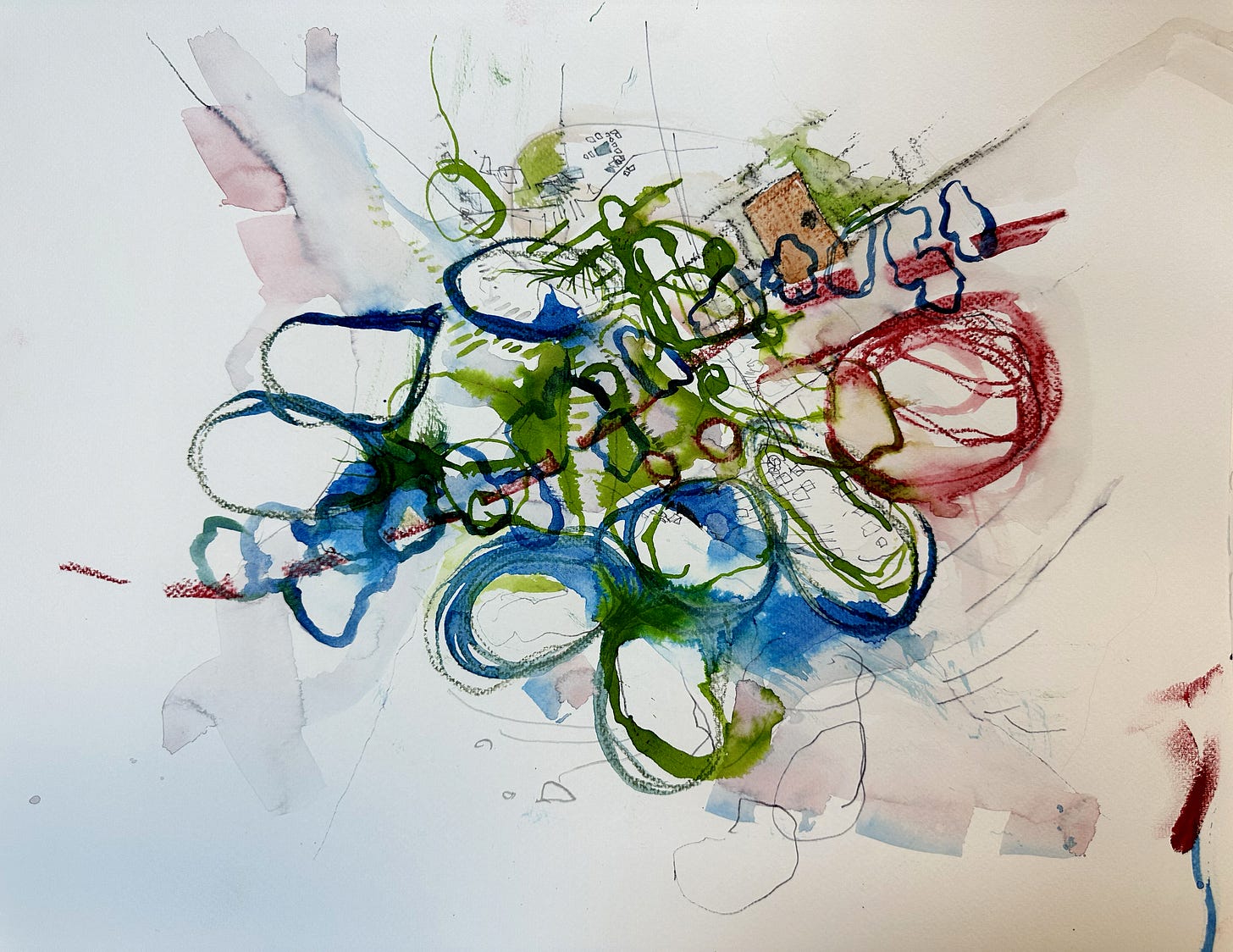
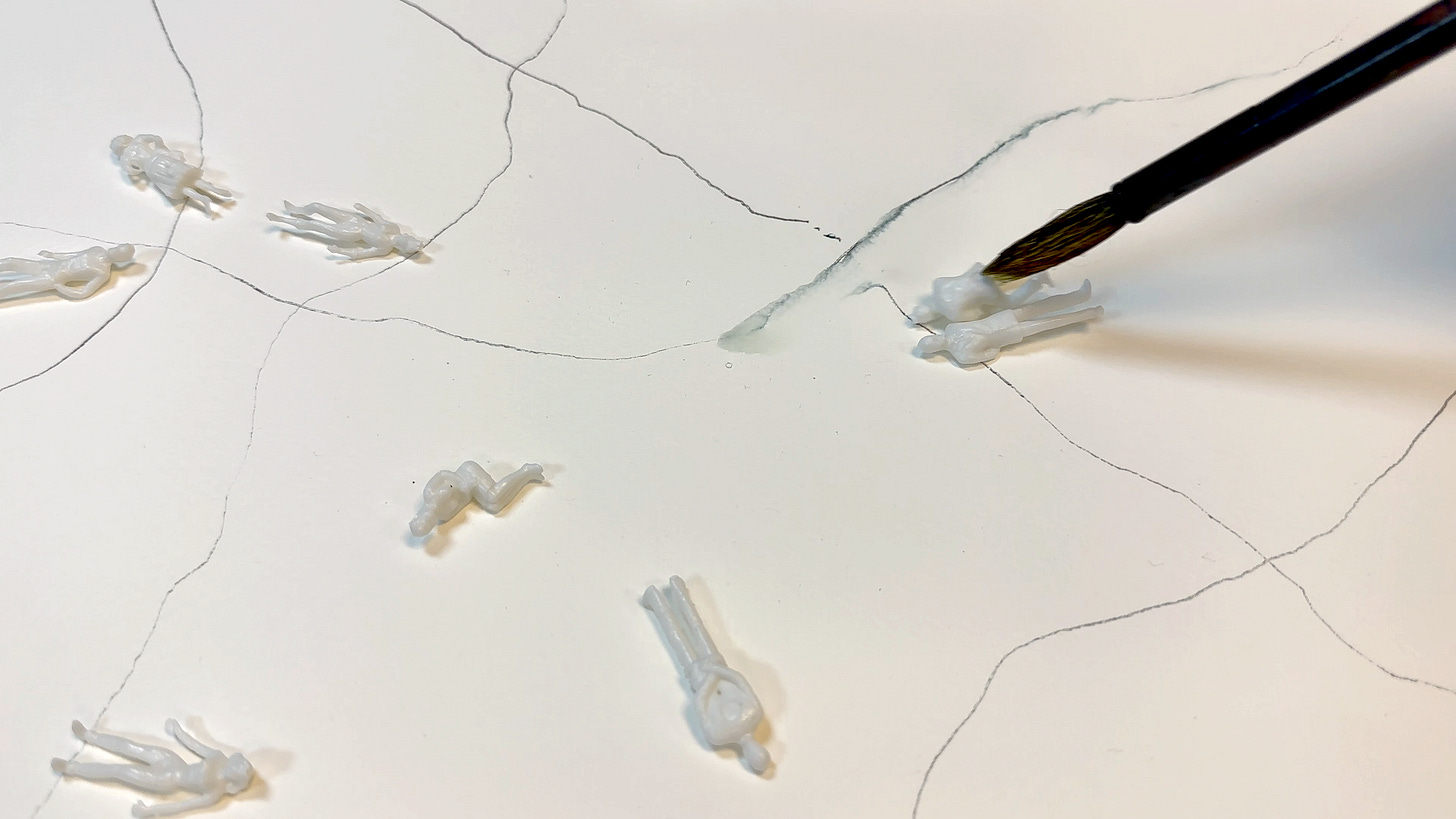

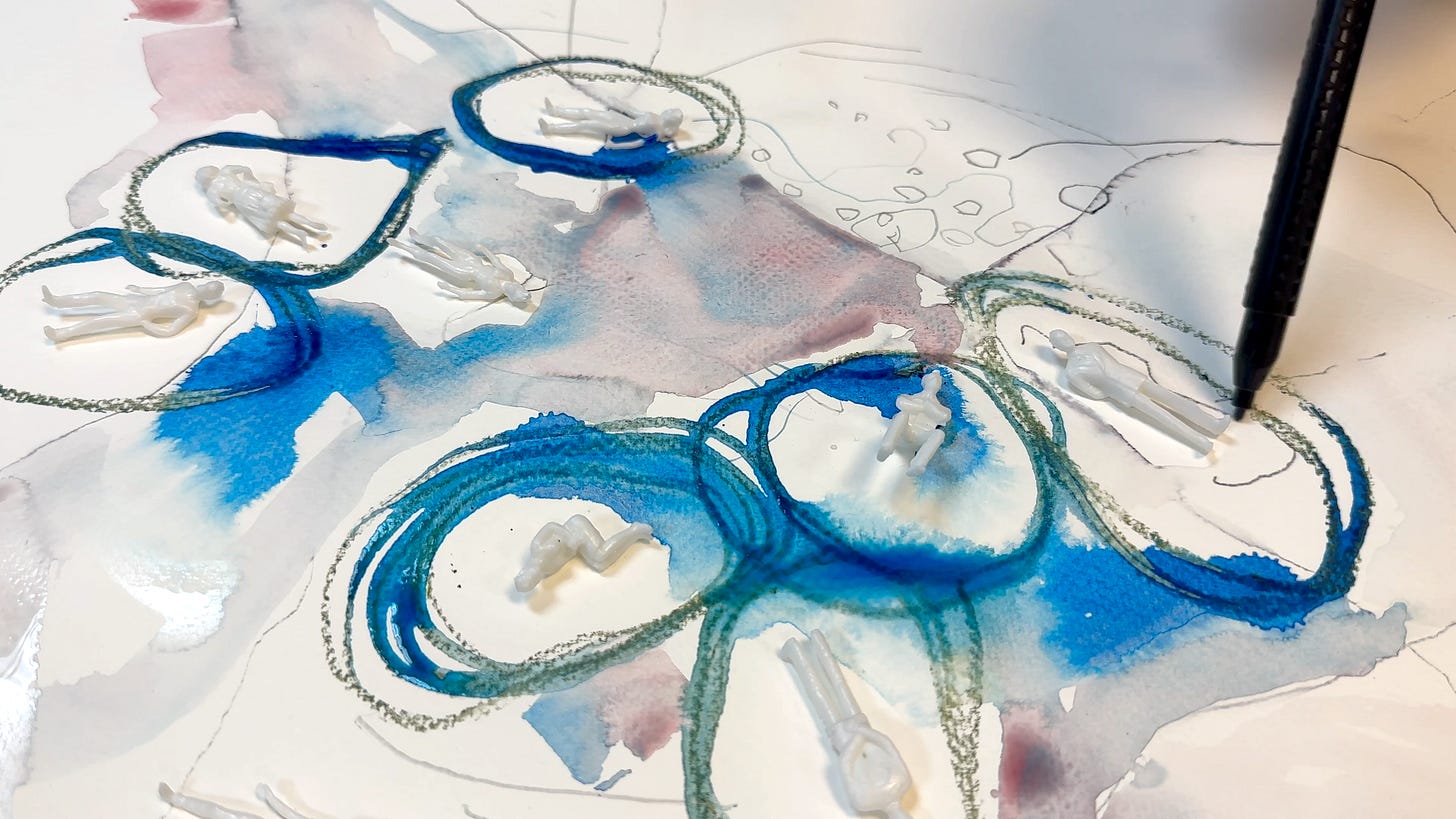
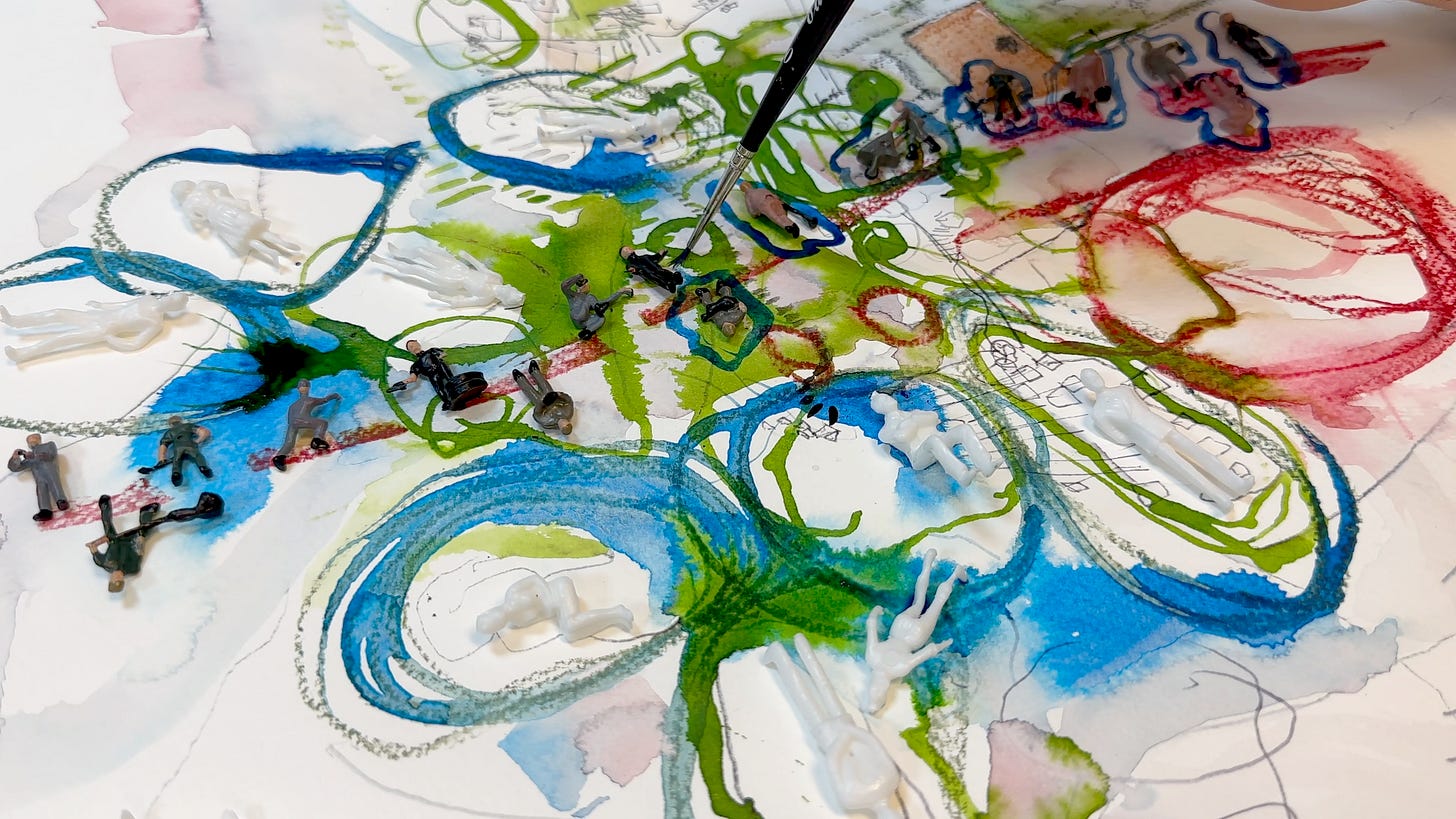
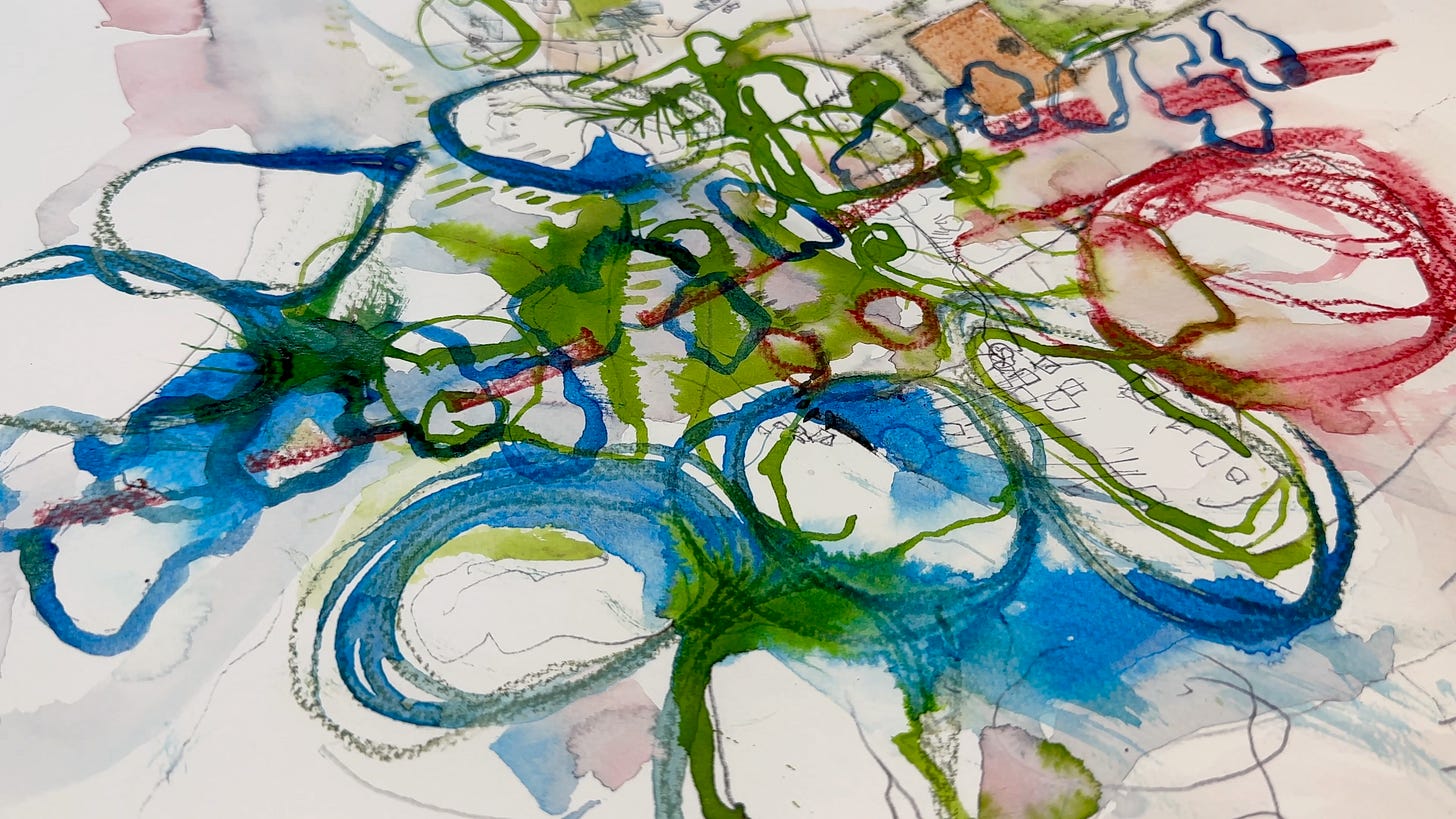
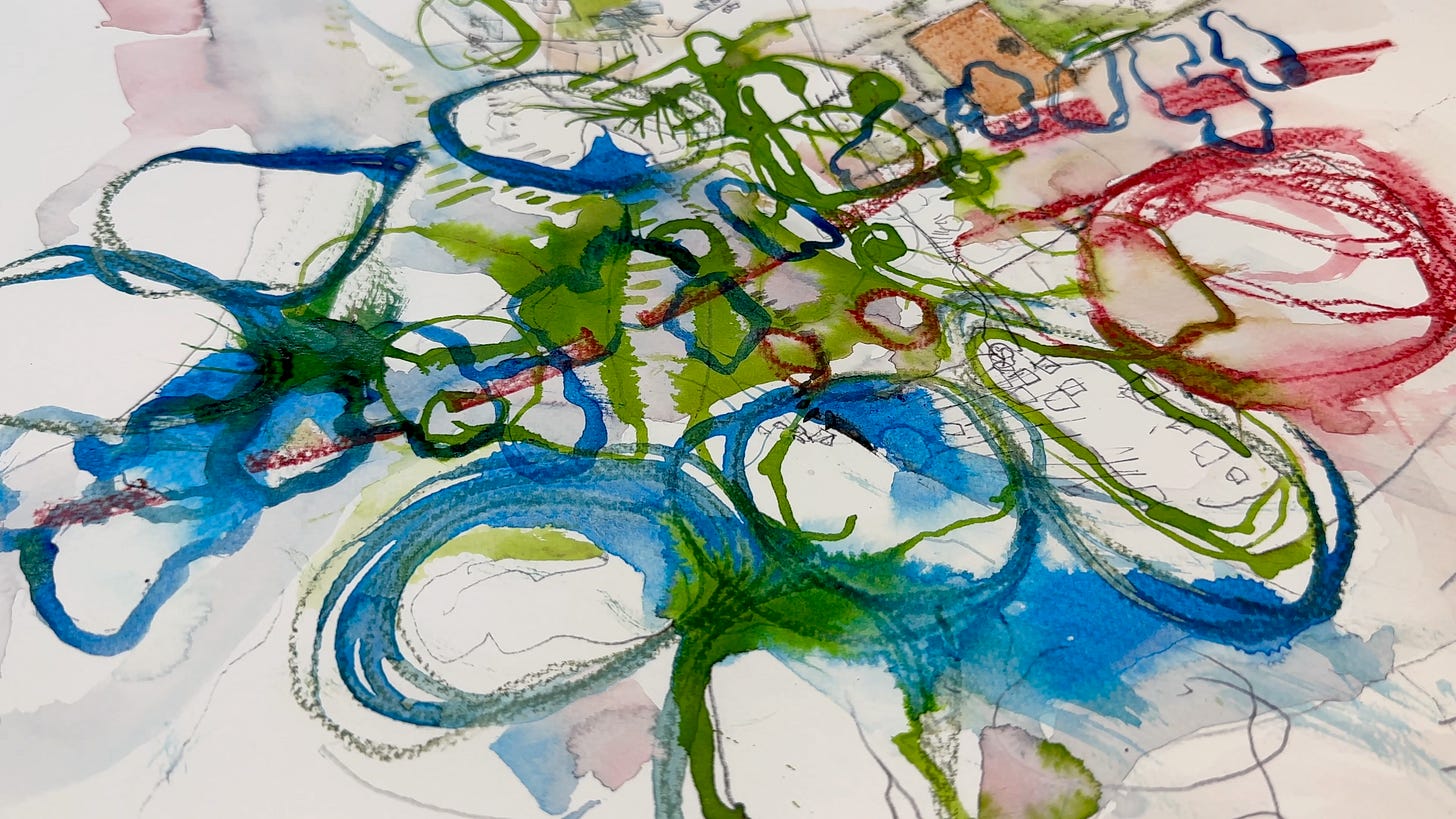

What a great piece!
'why not go for the widest possible diversity of approaches?' Here Here!!!! For we can learn much more from such an expansive view.